We are developing the social individualist meta-context for the future. From the very serious to the extremely frivolous... lets see what is on the mind of the Samizdata people.
Samizdata, derived from Samizdat /n. - a system of clandestine publication of banned literature in the USSR [Russ.,= self-publishing house]
|
One of the many felicities of Bill Bryson’s At Home: A Short History of Private Life, which I am currently engaged in reading and am enjoying greatly, is that noted warriors and statesmen do get mentioned, but for their peacetime activities.
The Duke of Wellington, for instance, gets just the two brief mentions, on page 128, for his habit of consuming a very large breakfast, this being an illustration of the then breakfasting habits of rich personages generally, and before that on page 49, when in his dotage Wellington was in nominal charge of an army of militiamen whose task would have been to quell any revolutionary outrages that the masses gathered for the Great Exhibition of 1851 might have felt inclined to perpetrate, outrages which were greatly feared at the time but which never materialised.
Concerning two big military and political movers and shakers on the other side of the Atlantic, Bryson has more to say, because they, unlike Wellington, made two very impressive and influential contributions (Jefferson’s Monticello and Washington’s Mount Vernon) to the art of domestic architecture, and in consequence to architecture generally:
Had Thomas Jefferson and George Washington merely been plantation owners who built interesting houses, that would have been accomplishment enough, but in fact of course between them they also instituted a political revolution, conducted a long war, created and tirelessly served a new nation, and spent years away from home. Despite these distractions, and without proper training or materials, they managed to build two of the most satisfying houses ever built. That really is quite an achievement.
Monticello’s celebrated contraptions – its silent dumbwaiters and dual-action doors and the like – are sometimes dismissed as gimmicks, but in fact they anticipated by 150 years or so the American love for labour-saving devices, and helped to make Monticello not just the most stylish house ever built in America but also the first modern one. But it is Mount Vernon that has been the more influential of the two. It became the ideal from which countless other houses, as well as drive-through banks, motels, restaurants and other roadside attractions, derive. Probably no other single building in America has been more widely copied – almost always, alas, with a certain robust kitschiness, but that is hardly Washington’s fault and decidedly unfair to his reputation. Not incidentally, he also introduced the first ha-ha into America and can reasonably claim to be the father of the American lawn; among all else he did, he devoted years of meticulous effort to trying to create the perfect bowling green, and in so doing became the leading authority in the New World on grass seed and grass.
It is remarkable to think that much less than a century separated Jefferson and Washington living in a wilderness without infrastructure from a Gilded Age America that dominated the world. At probably no time in history has daily life changed more radically and comprehensively than in the seventy-four years between the death of Thomas Jefferson in 1826 and the beginning of the following century …
A “ha-ha”, in case you are wondering, is a fence set in a ditch, which works as a regular fence for impeding animals, but which doesn’t spoil the view.
Concerning those “proper materials” that Washington and Jefferson lacked, I particularly enjoyed reading (pp. 424-8) about the infuriations suffered by rich pre-revolutionary Americans when trying to get Brits to send stuff over to America for them to build and furnish their houses, in sufficient quantities, of the correct sort, not ruined in transit, and for a non-extortionate price. The Brits insisted that everything that Americans bought from abroad had to go via Britain, even stuff originating in the West Indies. Of this draconian policy, Bryson says (p. 428):
This suppression of free trade greatly angered the Scottish economist Adam Smith (whose Wealth of Nations, not coincidentally, came out the same year that America declared its independence) but not nearly as much as it did the Americans, who naturally resented the idea of being kept eternally as a captive market. It would be overstating matters to suggest that the exasperations of commerce were the cause of the American revolution, but they were certainly a powerful component.
Despite such things as the dramas now going on in the Ukraine and in the Middle East, most of us now live amazingly peaceful and comfortable lives, when compared to the hideously warlike and uncomfortable lives lived in the past. That being so, more and more of us are going to want to read books like this one by Bryson, about how life became as comfortable as it now is, who contrived it, and how, and so forth and so on. We are now becoming the kind of people who attach more importance to things like why forks are the way they are, or why wallpaper started out being poisonous, or how vitamins were discovered and itemised, or how farming got better just when big new industrial populations needed more food, or how gardening became such a huge hobby or how meat, fruit and vegetables first got refrigerated, than we do to such things as the details of the Duke of Wellington’s or George Washington’s battles.
All this peace and comfort may turn out to be a mere interlude, if all-out war between Great Powers is resumed, and if that happened, the people in the formerly comfortable countries, like mine now, would soon rediscover any appetite they might now be losing for learning about war rather than about peace. But despite recent claims that our times resemble those just before WW1, I personally see little sign of a real no-holds-barred Great War erupting soon between two or more Great Powers. Putin is not Hitler reborn and Russia now is not 1940s Germany; the Muslims are mostly killing each other rather than us; and attacks with H-bomb barrages remain as utterly terrifying now as they have been ever since they were first made possible.
For the unlettered among you, the heptarchy is a collective name for the Seven Kingdoms of Westeros, Dorne, the Kingdom of the Isles and Rivers, the Kingdom of Monuntain and Vale, the Kingdom of the North, the Westerlands or Kingdom of the Rock, the Kingdom of the Reach, and the Kingdom of the Stormlands …
Bzzzt! Reset!
The heptarchy is a collective name for “the Anglo-Saxon kingdoms of south, east, and central England during late antiquity and the early Middle Ages, conventionally identified as seven: Northumbria, Mercia, East Anglia, Essex, Kent, Sussex, and Wessex. The Anglo-Saxon kingdoms eventually unified into the Kingdom of England.”
Like you care? You should. Following the vow made to the Scots by David Cameron in order to win the referendum of devo max to the limit of my credit card, the West Lothian question has come back to bite him.
The West Lothian question is easy to ask and almost impossible to answer. As posed in 1977 by Tam Dalyell, former MP for the Scottish constituency, it demands to know why MPs from Scotland (and now Wales and Northern Ireland) should be able to vote on issues such as health and education that affect England when English MPs have no power to vote on social and other policies that are devolved to the parliament in Edinburgh (and now also the assemblies in Cardiff and Belfast).
Because welfare issues are devolved, members of the Westminster parliament elected from Scotland, Wales and Northern Ireland have no power to decide how these policies should affect their constituents; ironically, they can vote only on welfare issues as they affect constituencies in England.
One solution to this might be simply to have the same type of devolution for England as is already present for Scotland, Wales and Northern Ireland. (Yes, I know that the arrangements for all three regions differ, but I’m just thinking in broad terms.) The trouble with that is that England has a population of 53 million as against Scotland’s five million, Wales’ three million and Northern Ireland’s 1.6 million. Quoting the same Guardian article by Joshua Rozenberg on the West Lothian question as above,
Vernon Bogdanor, research professor at the Institute of Contemporary British History at King’s College London, pointed out recently: “There is no federal system in the world in which one unit represents more than 80% of the population … Federations in which the largest unit dominated, such as the USSR, Czechoslovakia and Yugoslavia, have not been successful.” He also points out that there would be little appetite for a new English parliament, separate from Westminster.
So maybe we could split England up into smaller electoral regions for the purpose of voting on English matters? It has been tried. Almost nobody wanted it. Only the proposed North East England Regional Assembly ever appeared to have anything like enough support for anyone even to bother putting it to a vote, and the proposal was decisively rejected. The main reason for that rejection was that voters saw it as just another layer of politicians and bureaucrats whose salaries and fancy offices would have to be paid for out of their taxes. A less well-articulated but still significant reason was the feeling that it was all a plot to Balkanize England hatched by the European Union and England’s oikophobic elite. Which it was, though probably not one made consciously. Yet another reason was that the proposed regions were cultivated in a petri dish and hatched from a test tube. Many have loved the north east of England but nobody has ever loved “North East England”. No poet has ever penned such stirring lyrics as “To arms, citizens! Will ye stand back when enemies imperil our Regional Unit?”
It is an attractive idea to bring back the traditional counties of England. It is also an attractive idea to dig up the body of the man who abolished them, Edward Heath, and stick his head on a pike, but that won’t happen either. The counties are just too small.
So if we are to have petty kingdoms, let them at least be kingdoms. Men have loved the Kingdom of Mercia. Men have died for the Kingdom of East Anglia – notably at the hands of men of Mercia, but there you go. Men of all the ancient nations of the Saxon have followed the greatest of the Kings of Wessex to glorious victory against the Vikings. Divide and conquer that, Eurocrats! Also it would serve the Vikings right for subjecting me to all those irritating pictorial instructions.
Sorry, Scotland, I’m afraid that the contemporary Kingdom of Strathclyde will not be restored to the full extent of its ancient holdings where they stretch into modern England. As in post-colonial Africa, for the avoidance of bloodshed the external borders established by the imperialism of the Kingdom of Alba must remain in place. Whether Scotland should restore its own ancient sub-kingdoms within its present borders is naturally a devolved matter.
The British Army might be involved in a desperate struggle in northern France but that doesn’t mean that life should come to a standstill at home:
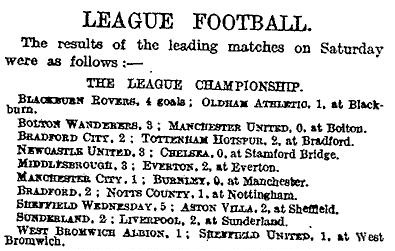 The Times, 14 September 1914 p2 I jest, the Football Association has asked for guidance. This is what the Army Council had to say:
The question whether the playing of matches should be entirely stopped is more a matter for the discretion of the Association, but the Council quite realise the difficulties involved in taking such an extreme step, and they would deprecate anything being done which does not appear to be called for by the present situation.
One of the problems – a problem that will haunt the British Army until 1917 – is that it is a small army with a small supply industry. There simply is no great stockpile of uniforms, weapons and ammunition and no easy way of producing more. Sure, the Army may have recrutied 100,000 men (or is it 500,000?) by this stage of the war but there’s precious little they can do with them. So football might as well continue, as indeed it did until the end of the season in 1915.
The Times from 12 September 1914. A vicar passes on a letter from his son, an officer in the British Expeditionary Force:
Another poor girl has just come in, having had both her breasts cut off. Luckily, I caught the Uhlan [German cavalryman] in the act, and with rifle at 300 yards killed him. And now whe is with us, but, poor girl, I am afraid she will die. She is very pretty, and only about 19, and only has her skirt on.
The article continues in a similar vein with this and other letters from the front telling tales of rape, the use of civilians as human shields and other forms of German treachery.
But what is one to think? I suppose the first question is, is it true? And then, was it intentional (on the part of the Uhlan)? Are there any mitigating factors? And are the British any better?
On that last one I am inclined to think yes, simply because they are amongst friends.
And on the first one, I see little reason why an officer or a vicar would make it up. But someone else might. And The Times which backs the war effort might not be that keen on checking up. Or maybe the officer was suffering hallucinations through lack of sleep.
But on the other hand, the Kaiser’s men did raze Louvain to the ground, and massacre civilians at Dinant and use the ones they hadn’t massacred as human shields.
Ultimately, I am inclined to believe this. And I am shocked. And if I am shocked a hundred years later it is not difficult to imagine what people must have been thinking at the time.
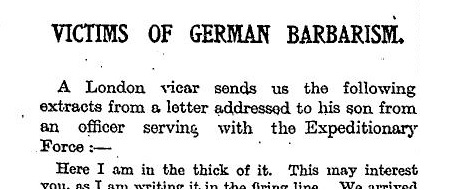
The “July Crisis” of 1914 may have come as a shock to the British but that does mean they were not able to weigh their options. I was surprised by the excellence of a couple of articles I came across in The Times. One of them appeared on the editorial pages, did not have a byline but didn’t appear to be an editorial either. It was still good though. This is the key passage:
France does not threaten our security. A German victory over France would threaten it irremediably. Even should the German Navy remain inactive, the occupation of Belgium and Northern France by German troops would strike a crushing blow at British security. We should then be obliged, alone and without allies, to bear the burden of keeping up a Fleet superior to that of Germany and of an Army proportionately strong. This burden would be ruinous.
That is the best explanation from Britain’s decision to go to war I ever heard. Peace is perilous.
The other was a letter from Norman Angell, author of The Great Illusion:
We are told that if we allow Germany to become victorious she would be so powerful as to threaten our existence by the occupation of Belgium, Holland, and possibly the North of France. But, as your article of to-day’s date so well points out, it was the difficulty which Germany found in Alsace-Lorraine which prevented her from acting against us in the South African War. If one province, so largely German in its origin and history, could create this embarrassment, what trouble will not Germany pile up for herself is she should attempt the absorption of a Belgium, a Holland, and a Normandy?
Rather depends on how civilised she plans on being. He goes on:
The object and effect of our entering into this war would be to ensure the victory of Russia and her Slavonic allies. Will a dominant Slavonic federation of, say, 200,000,000 autocratically governed people, with a very rudimentary civilisation, but heavily equipped for military aggression, be a less dangerous factor in Europe than a dominant Germany of 65,000,000 highly civilised and mainly given to the arts of trade and commerce?
A prediction, of course, that manages to be both very wrong and, ultimately, very right.

It will be obvious that this post was prompted by Perry Metzger’s post “A Sad Anniversary”.
Regarding the undoubted fact that the net result of the First World War was almost wholly bad, consider this analogy: your home is invaded by a gang, who have given ample evidence of their lawless nature as they rampaged through your neighbourhood before reaching you. Maybe you have not always been a blameless citizen yourself, but, by God, you won’t take this lying down. So you resist, calling in your family and neighbours to help. They pay a high price for their solidarity. At the end of the fight you look round and see relatives and friends dead, crippled and embittered. The neighbourhood you sought to defend has been wrecked. You also know that many of those dead gang members were more deluded than evil. What was it all for? Nothing has been gained, much has been lost. Worse yet, this slaughter will begin a cycle of violence that will take many more lives in future. Surely it would have been better all round to just let them in and let them take what they want?
Or would it?
One hundred years ago today, on July 28th, 1914, a month after the assassination of Archduke Franz Ferdinand, the Austro-Hungarian Empire declared war on the Kingdom of Serbia and began an invasion. This was the official beginning of World War I.
Within weeks, every major and most minor countries in Europe had declared war upon some subset of the others.
Almost all wars are a terrible, stupid waste of human life, but “The Great War” was especially pointless.
You can grossly oversimplify and explain what most wars were about in a sentence or two. World War II could be said to have been about a group of governments attempting to gain through conquest and others trying to stop them. Vietnam could be explained as the US government’s attempt to back an authoritarian government with little internal support to try to hold back a communist takeover. These aren’t great explanations but they’re at least “sort of” explanations.
World War I has no real explanation beyond “a bunch of inter-governmental alliances got triggered in the aftermath of an assassination.” If you study the events in a history class, it takes days to explain the causes of the war, which is to say, to get to the point where you understand that there wasn’t really much of a cause, and not really much in the way of actual objectives on either side. (Sure there are “explanations” and I’m certain someone with a pedantic streak will bring them up, but I feel that they’re beside the point.)
It was not war for conquest, not war for political objectives, just war for war’s sake.
In spite of this lack of real purpose, enormous patriotic fervor was brought to bear by both sides. Anyone opposing the war was painted as a near enemy of humanity. Young men by the millions were conscripted or (even more tragically) convinced to voluntarily enlist “for their country”.
In the end, 16 million people died and a further 21 million suffered injury, some grievously enough to render them crippled for life, and all, in the end, to accomplish nothing of significance.
One might have thought that something might have been learned by our culture from this event, that the deaths of the millions might have at least brought about some sort of lasting moral disgust that convinced people that perhaps there was something deeply sick about blind patriotism, that perhaps warfare was in general not a glorious pursuit, that perhaps the presumption that governments act in the interest of their population might be misguided, etc.
There was, of course, a brief paroxysm of loathing. How could there not be when so many of Europe’s young men died uselessly in muddy holes? However, it did not last. The cultural memory faded quickly. Eventually, the world went back to business as usual, with governments slaughtering each other’s populations, and even more often their own populations, with increasing zeal.
World War I proved to be just an overture. The 16 million killed were barely a footnote in what was to come. In the 20th Century, about 160 million people died in wars, and about a further 260 million were killed by their own governments in democides of one sort or another. That’s 420 million people killed by various sorts of government managed madness in a single century alone.
420 million people killed by governments. That’s a staggering figure, far, far beyond my ability to comprehend.
Has the bloodletting ceased, now, in the 21st century? No, of course it has not. The human race appears to be immune to education.
And this is why, tonight night, I’m going to sit in a very old pub in New York City, raise a glass of scotch, and mourn for the dead, as too few people seems to remember them.
Today is the anniversary of the fall of the Bastille. It is easy – way too easy, in fact – for a Brit to make some sort of snide comment about the bloody awfulness (literally) of the events of that time, the Revolution, the terrible example of, well, the Terror, and so on. But, but trying to rise above all that obvious “god those Frenchies made a right pig of their revolution” sort of line, I am going to ask readers the following: What were, in your view, the good things that flowed from the Revolution?
Go on.
Instapundit linked to this: Razr Burn: My Month with 2004’s Most Exciting Phone. Apparently, having become accustomed to smartphones, the lady found the ten year old Motorola Razr V3 un-smart.
Lady, that ain’t a 2004 phone.
This is a 2004 phone.
OK, it would have been nice at this point to download a picture of my phone. But one can’t do that with the Sagem myX-2, the only cell phone that a person of discernment need ever own. The myX-2 does not hamper my appreciation of the world by tempting me to take photographs. Nor does it download things, preferring to keep itself pure. I believe that it is capable of going to look at the internet, at warp 48.3, I am told, but in the decade since I first owned this jewel among telephonic devices, my affairs have never been so disarranged as to oblige me to attempt this feat.
It sends text messages. There is a thing called “predictive text”, but I prefer to make my own decisions.
It has a picture puzzle in which one does something or other with a grid of numbers. Of course technology has moved on and no one nowadays would play anything so primitive.
It falls into rivers. It gets left in the saddlebag of a bicycle stored in a lean-to shed for a month. It is stroked lovingly by people who had one in 2003. It distracts jurors from the case in hand when all the mobiles have to be put in a safe and it is the coolest one there. It bounces. It will be replaced when it finally dies which is sure to happen by 2008 at the latest.
You can telephone people on it.
Samizdata’s World War 1 correspondent Patrick Crozier and I are presently in Sarajevo, on the hundredth anniversary of the assassination of the Archduke Franz Ferdinand, which triggered World War 1. It has been a slightly peculiar occasion, as nobody – local, or visiting – seems to be quite clear about what exactly is the correct way to commemorate such an event. There are musical events, art exhibitions (mostly only tangentially related to the occasion), conferences, and a vast number of television crews from all around the world looking for people to interview and things to film other than one another, mostly without great success. It has been, a long, hot day, and the journey into Sarajevo from Belgrade (that we made yesterday evening) is a long and tiring one through steep mountain roads, and I lack the strength to write at length now, alas.
However, whatever the correct way of commemorating an event such as this is, my guess is that it does not involve dressing up as the Archduke and/or his wife Sophie and sitting in a similar open car to the one they were riding in when they were murdered on the exact same spot exactly one hundred years earlier.
It was, however, possible to to that in Sarajevo today.

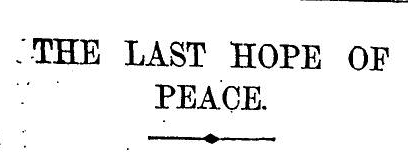 The Times 20 June 1914 p8 Now you might think that a headline like that (from 20 June 1914) would be prescient. But no. They are not referring to the prospect of a world war but to the prospect of civil war in Ireland.
It is an issue that has been dominating the pages of The Times for the last two years. In that time the debate had not moved on an inch. It can’t because the aims of nationalists and unionists are fundamentally incompatible.
For our ancestors the prospect of a world war exists but there are no obvious crises at the moment and anyway all those that have threatened to blow up have been diffused pretty quickly.
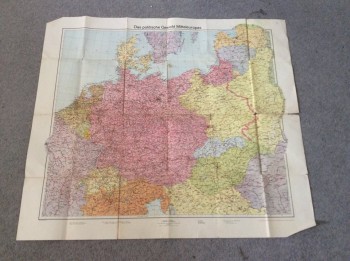
Partly due to despair at my unwillingness to decorate my flat in any way whatsoever, and partly because she knows I like this kind of thing, a friend of mine sent me this antique map of central Europe as a gift. She obtained it in an antiquarian map shop in Krakow, Poland.
First, obvious observation. This is a map from Nazi Germany. In the margin, it is identified as being the product of a mapmaker in Leipzig, but there is no date given.
Secondly, when I see a historical map, I like to play the game of figuring out the dates of the map by looking at the border, and using my historical knowledge of political geography to narrow the date down.
Figuring out the year of this map is easy. This map is from 1939. In most instances, getting the year is all you want to do. However, 1939 was a somewhat problematic year.
Klaipeda and the area around it is shown as part of Germany, not Lithuania. Also, Czechoslovakia has ceased to exist, Bohemia and Moravia has been annexed by the Reich, Slovakia is a supposedly independent country, and Carpathian Ruthenia has been invaded and annexed by Hungary. All these events occurred in March 1939, so the map was clearly designed after March 1939.
It’s looking at Poland that things get interesting. Firstly, Danzig is not shown as a free city, but is shown as part of the Reich. Danzig was invaded by Germany on 1 September 1939, proclaimed part of Germany on 2 September, and formally annexed under German law on 8 October. Danzig had, however, been under the control of the local Nazi party since 1933, and would have joined Germany instantly if it had been allowed to under international law. Is it possible that some German maps showed Danzig as part of Germany prior to September 1939? Possible, but I suspect probably not.
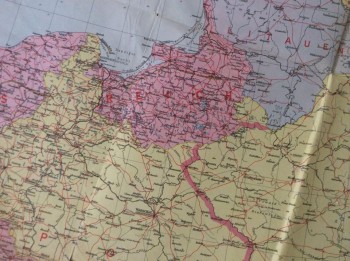
By far the most fascinating thing in this map is the red line through Poland, however. Poland is clearly identified as “Polen”, but the Molotov-Rippentrop line – it the limits of German occupation after the invasion of Germany in September 1939 – has been drawn through it. Therefore the map must have been printed no earlier than September 1939. This has clearly been printed at the same time as the rest of the map – it is not something someone added with a pen later, or anything like that.
What I suppose is possible is that the mapmaker had a map prepared reflecting recent border changes immediately prior to the German invasion of Poland in September 1939. When the invasion occurred, the map was quickly modified to show Danzig as German and the zones of German and Soviet occupation before being printed and sold.
And yet, this map does not reflect the view of the world that the Nazis wanted to present. Upon invading Poland, they declared that Poland as a country did not exist. On that same date of October 8, Germany formally annexed the northern and western sections of their Polish conquests (including the Suwalki triangle, clearly shown on this map), and declared the South-East to be the “General-government”, essentially a German colony (but not a “Germany colony in Poland”, as Poland did not exist). This map is therefore curious, as it essentially shows Poland (clearly identified as Poland) under German (and Soviet) occupation.
I cannot imagine maps like this being printed in Germany long after the annexation decree of October 1939. In the Nazi view, there was no occupied Poland the way there was later an occupied France. There was simply German territory that unfortunately happened to have Poles, other Slavs, and Jews living in it. It’s easy to imagine foreign maps from later showing the German and Soviet occupation of Poland like this, but German ones, not so much. So my conclusion is that this map was printed very soon indeed after the German invasion of Poland in September 1939.
Plus of course this map ended up in an antiquarian map shop in Krakow in Poland, which between 1939 and 1945 was in that aforementioned “General Government”. One has no idea how and when it got there, but I suspect that “during the occupation” is the most likely answer.
Thoughts anyone?
|
Who Are We? The Samizdata people are a bunch of sinister and heavily armed globalist illuminati who seek to infect the entire world with the values of personal liberty and several property. Amongst our many crimes is a sense of humour and the intermittent use of British spelling.
We are also a varied group made up of social individualists, classical liberals, whigs, libertarians, extropians, futurists, ‘Porcupines’, Karl Popper fetishists, recovering neo-conservatives, crazed Ayn Rand worshipers, over-caffeinated Virginia Postrel devotees, witty Frédéric Bastiat wannabes, cypherpunks, minarchists, kritarchists and wild-eyed anarcho-capitalists from Britain, North America, Australia and Europe.
|










